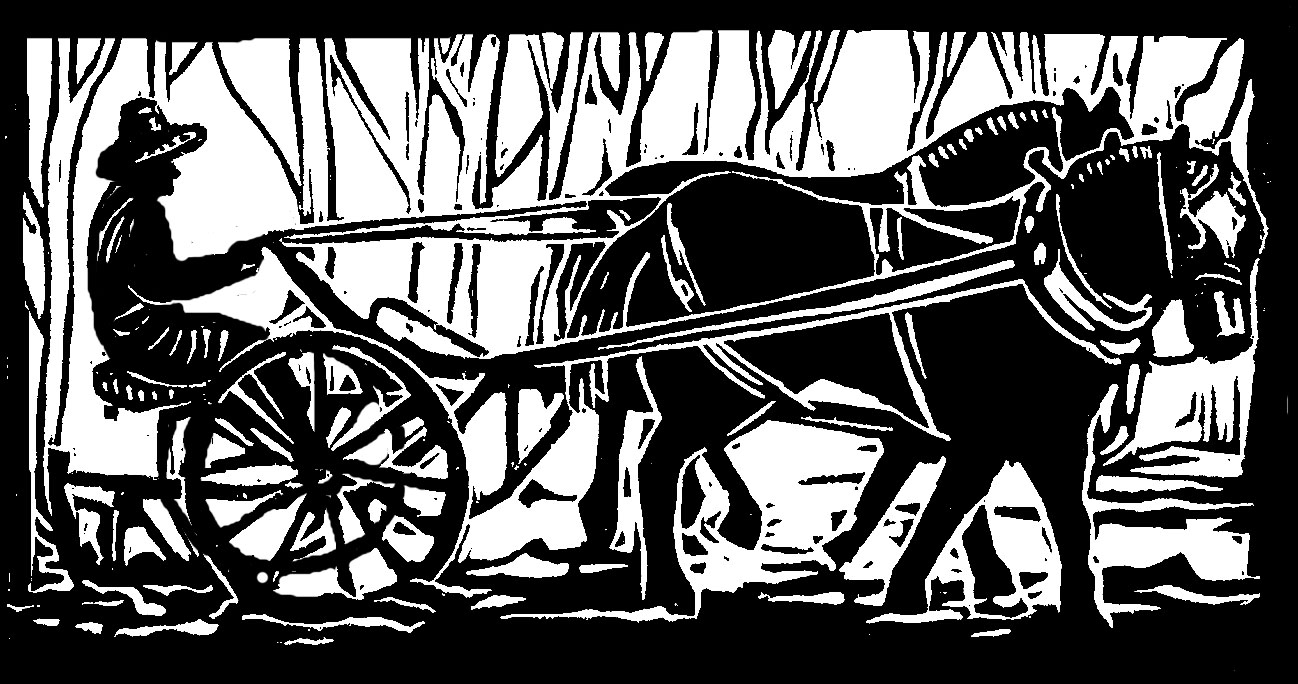Not long ago, we had a message on our phone. A person said carefully, “We'd like to come out to your farm – your horse-powered farm – ” very precisely, as if she was reading a script, or as if we might try to have her come to one of our other farms, our tractor-powered farm, or our camel-powered farm, for instance.
“But who is it?” I said.
“It's the TV!” my fellow farmer answered, gleefully. “They want us to be on TV!”
I grumbled. “I don't want to be on TV. We don't even have a TV. We haven't had one for twenty years. It'll be weird and sensationalist like everything these days.”
My fellow grinned at me, probably wondering what exactly we would do on our fam that could possibly be sensationalistic. “You can get it on the Internet too. Come watch the show with me. It's really hokey. You'll love it.”
“Oh, geesh,” I said, but we did watch a segment of NH Chronicles, which is hokey in the nicest possible way, in the way that we use the word hokey on our farm, to mean wholesome and pleasing, genuine and a little goofy. The show covers a variety of interesting stories in New Hampshire.
“Well, I'm good at hokey,” I said.
“I'll set up a date!” my fellow said quickly, before I changed my mind.
Of course, when the day came, and we were frantically tidying up around the place, I was very nervous about the whole thing, and regretful indeed that I hadn't changed my mind.
“You're great at hokey,” my fellow encouraged me. “Here they come!”
There they were, just one regular car, and two regular people: a very nice reporter named Karen, and a very nice photographer named Jason. Karen had an umbrella, and Jason had a camera, and they looked worriedly at the sky. There were predictions of rain, so we went right away to the field for a draft horse demonstration.
My fellow farmer, and Molly and Ben the horses, set to discing the spring section, in preparation for a cover crop. The disc hit a big rock, and my fellow made a big leap, landing on his feet. He smiled and waved, and hopped back on the disc. But not for long.
Another abrupt stop, another smile and wave from my fellow TV star: this time the wheel had fallen completely off the disc. The photographer put down his camera, and kindly carried the wheel over to the disc. Meanwhile I ran for some locking pliers, and we rigged the wheel back up.
Then the photographer wanted a different view of discing. My fellow offered the seat on the disc, and he walked along, driving the horses.
Karen and I watched, appreciating the interesting angle of the camera. The horses stepped ahead, the disc moved ahead, and the photographer . . . seemed to be leaning quite far backwards. In a slow motion move worthy of fine cinematography, the photographer leaned further and further back, more and more and more, and then he incrementally, gracefully fell right off the disc, still clutching his camera.
Oh no! We all rushed to his aid, as he gimped upright again. “What happened? Are you all right? Is your camera all right?”
“Yeah, yeah, I'm fine,” he said. wincing. “I'm all right. The seat broke.”
First the farmer, then the wheel, then the photographer . . . (who by the way, did not smile and wave). We offered menthol salve and aspirin, and the high compliment that he was the only person besides my fellow who had ever had the honor of falling off one of our implements.
Jason nodded, rubbing his side gingerly, not looking especially honored. But he did persevere in the shoot: the horses discing, plowing, and cultivating, the farmers weeding and harvesting. Then we scrambled into the barn, just as the rain began, and Karen interviewed us in front of our blissfully full hay mow, and our tables of curing garlic.
“Now, don't worry,” she said, “This is very low-key, very casual, informal, and it doesn't matter if you say something you don't mean, or even if you swear, we can edit it out. It's not live.”
My fellow farmer smiled at me: See? People who are worried about swearing on TV in this day and age? Now that's hokey.
It was kind of fun, too, telling stories about our farm, and then we had a break in the rain to look at the greenhouses and the cutting flowers and the horse machinery, and to watch the horses rolling in the field after their work. It was also fascinating to get a glimpse of this other work, TV work. After four hours of filming, and many more hours of writing and editing, the segment would be only six minutes long.
“That's really long,” said Karen, “You get a minute and a half on the news. That's why I like to do this, so I can meet people and learn about things.”
“Wow,” we said. It's like boiling down 40 gallons of sap into a gallon of maple syrup. Or maybe like spending six months growing a red pepper, and then eating it in six luscious minutes.
If you'd like to see six luscious minutes of your local hokey famers on TV, tune in to NH Chronicles on Channel 9 WMUR at 7 p.m. on Thursday, October 17th, or after the 17th, use the website link: https://www.wmur.com/chronicle .
Originally published in the Monadnock Shopper News, Oct 23 - 29, 2019
